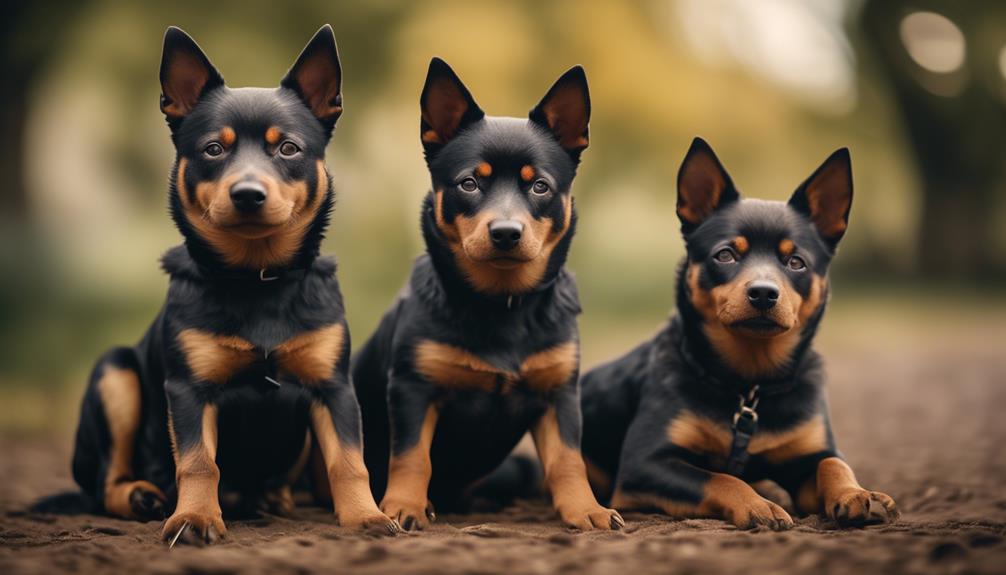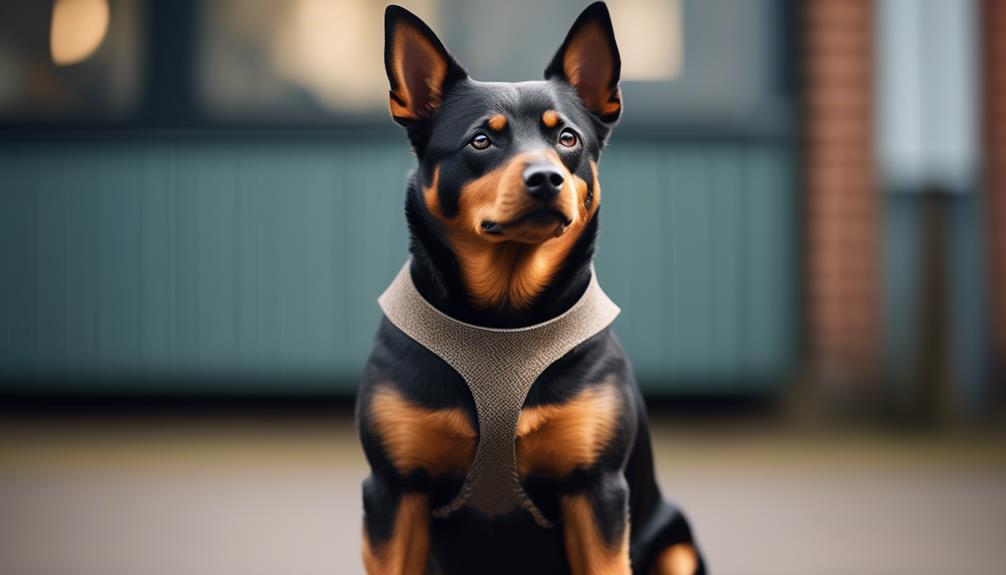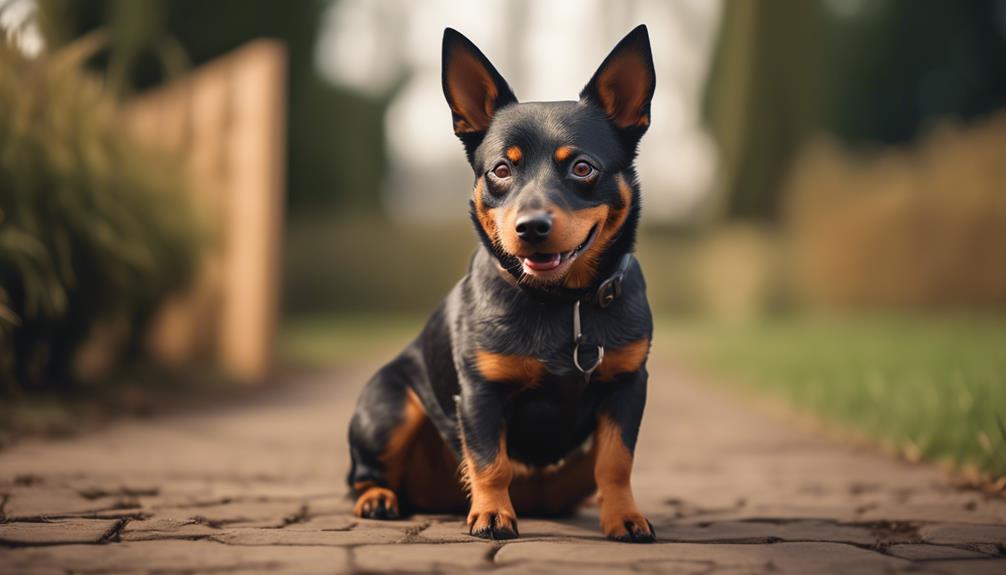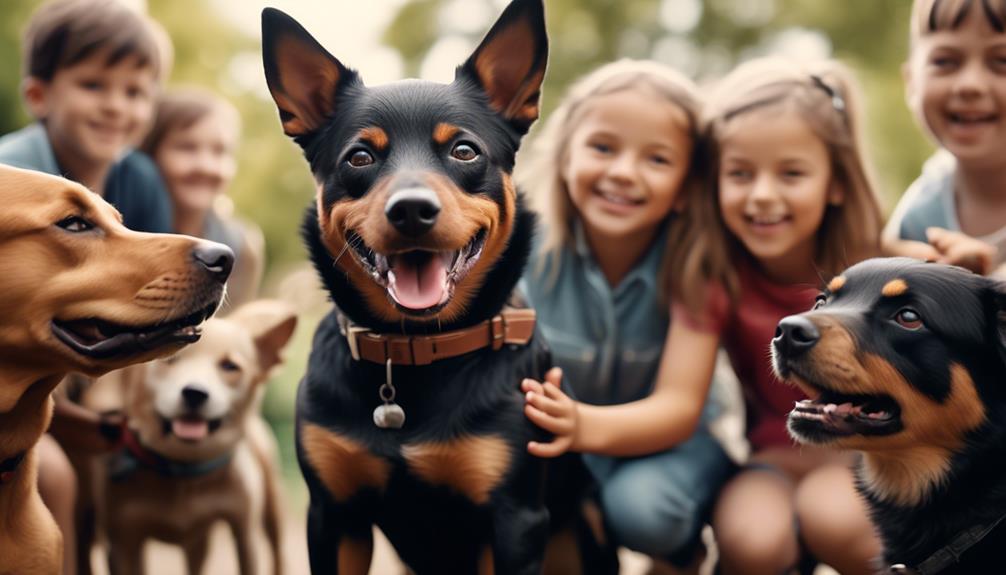Have you ever wondered what makes the Lancashire Heeler such a unique and fascinating breed? Well, get ready to uncover the truth behind their origin and characteristics.
From their small yet sturdy stature to their mischievous and intelligent nature, Lancashire Heelers have captured the hearts of many dog enthusiasts. But there's more to this breed than meets the eye.
So, if you're curious to discover what sets them apart from other dogs, and how they can become the perfect addition to your family, then keep on reading.
Key Takeaways
- Lancashire Heelers are a small herding breed from England with a lifespan of 12-15 years.
- They have a short, weather-resistant coat and resemble Welsh Corgis in appearance.
- Lancashire Heelers are intelligent but can be stubborn and mischievous, so early socialization is important.
- They are adaptable to apartment living, but consideration of neighbors and regular exercise is necessary.
Origin and Size
The Lancashire Heeler is a small dog breed originating from England. It is known for its compact size and unique herding abilities. These dogs typically stand at a height of 10-12 inches and weigh between 13-26 pounds. They belong to the herding group and have a lifespan of 12-15 years.
Lancashire Heelers have a short, smooth, and weather-resistant coat. They were historically used to drive livestock and catch rats and rabbits. Resembling Welsh Corgis, they have a black-and-tan coloration.
Lancashire Heelers are intelligent but can be stubborn and mischievous. Early socialization is important for fostering friendly behavior towards people and other dogs. They are best suited for families with school-age children and require a secure yard for exercise.
Breed Group and Lifespan

Lancashire Heelers belong to the herding breed group and have a lifespan of 12-15 years. As herding dogs, Lancashire Heelers were historically used to drive livestock and catch rats and rabbits. They're small in size, typically measuring 10-12 inches tall and weighing between 13-26 pounds.
Lancashire Heelers have a short, smooth, and weather-resistant coat that requires low-maintenance grooming. They resemble Welsh Corgis but have a unique black-and-tan coloration. Lancashire Heelers are known for their intelligence but can also be stubborn and mischievous. Early socialization is important to ensure friendly behavior towards people and other dogs.
They're best suited for families with school-age children and require a secure yard for exercise.
Coat and Appearance

With a coat that's short, smooth, and weather-resistant, the Lancashire Heeler exudes a sleek and resilient appearance. Their coat isn't only aesthetically pleasing but also serves a practical purpose in protecting them from various weather conditions. Here are some key features of the Lancashire Heeler's coat and appearance:
- Shiny and coarse coat in black or liver color with tan markings
- Fine undercoat below a thick, weather-resistant topcoat
- Slightly longer coat around the neck, adding to their charm
- Low-maintenance grooming with regular brushing and bathing only when necessary
The Lancashire Heeler's coat not only enhances their appearance but also reflects their adaptability and ability to withstand different climates. It's no wonder they're often admired for their smart and stylish appearance.
Temperament and Behavior

When considering the temperament and behavior of the Lancashire Heeler, it's important to note their intelligence and potential for stubbornness.
Lancashire Heelers are known for being intelligent dogs, which means they can quickly learn and understand commands. However, this intelligence can also make them stubborn at times, as they may have their own ideas and preferences.
It's essential to provide consistent and firm training to establish boundaries and ensure they understand their place in the family hierarchy.
Additionally, Lancashire Heelers are generally affectionate dogs, but specific information about their friendliness isn't given. Proper socialization from an early age is crucial to ensure they're friendly and well-behaved towards both people and other dogs.
Exercise and Energy Levels

To ensure the overall well-being of your Lancashire Heeler, it's important to understand their exercise needs and energy levels. Here are some key points to keep in mind:
- Lancashire Heelers have high energy levels and require significant exercise to keep them happy and healthy.
- Regular exercise not only helps them burn off energy but also keeps them mentally stimulated.
Providing mental stimulation through puzzle toys and obedience training is important for their overall well-being.
Engaging in activities such as dog sports or agility training can help fulfill their exercise needs and boost their agility.
Health and Care

Regular veterinary examinations are important for early detection of potential health problems in Lancashire Heelers. Due to their small gene pool, Lancashire Heelers are prone to certain health issues. These include cataracts, disc diseases, cancer, lens luxation, and collie eye anomaly. Prevention is key, and routine check-ups with a veterinarian can help catch any problems early on.
Grooming is relatively low-maintenance, with regular brushing to maintain their coarse, shiny coat. Baths should only be given when necessary.
A balanced diet is essential, with high-quality sources of animal protein, a moderate amount of healthy fats, and carbohydrates from whole grains like brown rice or oats. Consult your vet for adding fruits and vegetables to their diet.
Lancashire Heelers can coexist well with children and other pets, but proper socialization and obedience training are necessary to manage their herding instincts and interactions with smaller animals.
Compatibility With Children and Other Pets

As we continue our exploration of Lancashire Heeler health and care, let's now turn our attention to their compatibility with children and other pets. Lancashire Heelers can make great companions for children and other animals if they're properly socialized and trained. Here are a few key points to consider:
- Lancashire Heelers are generally good with children, but supervision is important to ensure gentle interactions.
- With their herding instincts, Lancashire Heelers may try to herd smaller animals, so careful introduction and obedience training are necessary.
- Early socialization and positive reinforcement training can help Lancashire Heelers develop good manners and get along well with other dogs and pets.
- It's important to provide a secure and supervised environment to ensure a harmonious multi-pet household.
Frequently Asked Questions
What Are Some Common Health Issues That Lancashire Heelers May Experience?
Lancashire Heelers may experience common health issues such as cataracts, disc diseases, cancer, lens luxation, and collie eye anomaly. Regular vet exams are important for early detection, and a balanced diet and grooming are essential for their well-being.
Are Lancashire Heelers Good With Children and Other Pets?
Yes, Lancashire Heelers can be good with children and other pets. Their compatibility depends on temperament, socialization, and training. Supervision and obedience training may be needed, especially due to their herding instincts.
How Much Exercise Do Lancashire Heelers Require on a Daily Basis?
Lancashire Heelers require a moderate amount of exercise on a daily basis. Regular walks and playtime in a secure yard will help keep them happy and healthy. Remember to also provide mental stimulation through puzzle toys and obedience training.
Are Lancashire Heelers Prone to Excessive Barking?
No, Lancashire Heelers are not prone to excessive barking. They may bark to alert you, but with proper training and socialization, they can be polite and well-behaved.
Can Lancashire Heelers Be Left Alone for Long Periods of Time?
No, Lancashire Heelers cannot be left alone for long periods of time. They are social dogs that require companionship and can become anxious or develop behavioral issues if left alone for extended periods.
What are the similarities and differences between the Lancashire Heeler and Norwegian Lundehund dog breeds?
The Lancashire Heeler and Norwegian Lundehund dog breeds have some similarities, such as their small size and high energy levels. However, the Norwegian Lundehund breed characteristics stand out with their unique ability to bend their head backwards along with an extra toe on each foot, while the Lancashire Heeler does not display these traits.
Conclusion
In conclusion, the Lancashire Heeler is a wonderful breed to consider adding to your family. They're intelligent, mischievous, and make great family pets with proper socialization.
Their adaptability to various climates and their short, weather-resistant coat make them well-suited for different environments.
With their affectionate nature and need for exercise, they're best suited for families with school-age children and a secure yard.
Overall, the Lancashire Heeler is a lovable and energetic companion that will bring joy to your home.




